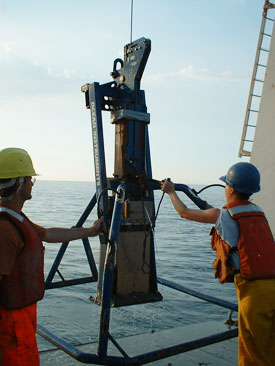
The Chemical Oceanography group at Horn Point Laboratory has expertise in both water column and sedimentary chemistry. Although much of the work is concentrated in Chesapeake Bay, our research spans the globe. Similarly our research interests include a wide variety of topics ranging from basic to applied research including instrument development. Much of our focus is on nutrients that in excess lead to eutrophication and oxygen deficiency, and that may promote harmful algal blooms. A particular interest is the processes that control fixed-nitrogen concentration over regional to global space scales, and hourly to geologic time-scales.
We have a particular expertise in nitrogen transformations under suboxic and anoxic conditions and how these processes alter fixed-nitrogen concentrations, and the ocean’s ability to absorb carbon dioxide. Our applied research includes the development of autonomous sampling systems, mass spectrometric techniques for studying nitrogen transformations, and the effects of dredging on nutrient balances.
Because of the inter-disciplinary nature of our research, we participate in collaborative research with several UMCES/HPL colleagues and a large number of U.S. and international colleagues. Collaborative projects with Horn Point Laboratory colleagues include investigations of harmful algal blooms and studies of how the drastic decrease in oysters may have exacerbated anthropogenic nutrient additions.
Students in our laboratories have investigated water column nutrient uptake and recycling, wetland cycling of nutrients and sulfur, suboxic diagenesis in estuarine sediments, denitrification in estuarine sediments, the influence of benthic microalgae on nutrient cycles, and the deposition of nutrients and contaminants in Chesapeake waterways. We welcome students with interests in problems that are 1) either basic or applied in nature, 2) located in shallow water, deep water, sediments or wetlands, 3) and that have a geological, biological or physical interface with biogeochemistry.
Specialized research areas at HPL include:
- Bay Nutrient Influx
- Western Arctic Research
- HAB Urea Monitoring
- Sediment Denitrification
- Subtropical Nutrient Cycling
- Benthic Microalgae & Nutrients
- Phosphorus Biogeochemistry
